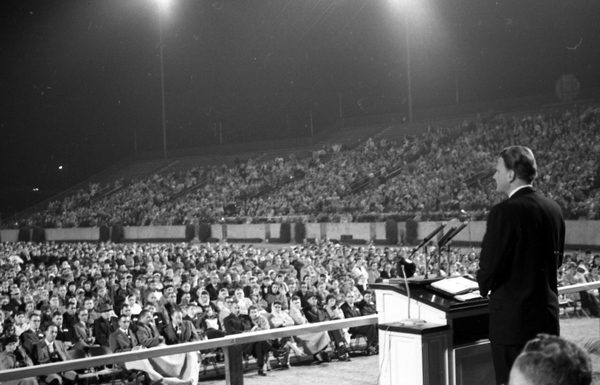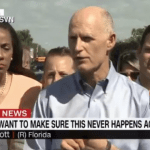 (Credit: Florida Memory, Flickr Creative Commons)
(Credit: Florida Memory, Flickr Creative Commons)
On a June evening just before my junior year in high school, I joined some 45,000 people on the banks of the Cumberland River in Nashville, TN to hear Billy Graham preach.
As a would-be preacher myself, he was my hero.
He was a Baptist and I was a Nazarene and Baptists and Nazarenes don’t always agree on theology, but the one thing we could agree on was the fact that Billy Graham was probably the best preacher since Jesus.
I was in awe of his ability to command not just a room, but quite literally an entire stadium.
Other preachers would follow in his footsteps and preach to even more people in even bigger stadiums, but no one’s name will ever be as synonymous with preaching as the late, great Billy Graham.
As an adult, however, I’ve grown to become more impressed by something else Billy Graham could do.
He could admit when he was wrong, even when doing so meant a great deal of public humiliation.
It’s hard to imagine this now, particularly if, like me, you weren’t alive back then, but in the 1970s, Billy Graham was to Richard Nixon what Jerry Falwell Jr., Robert Jeffress, and (perhaps ironically) Franklin Graham have become to Donald Trump.
You might argue that Billy wasn’t quite as sycophantic as they are to someone so objectively and publicly unchristlike as Trump, but Graham provided the same sort of religious cover and passionate support for Nixon that his son and others would one day do for Trump and as we all know now – and many knew then – Nixon was no saint.
And neither was Billy Graham, as painful as it is for me to admit that.
But unlike so many religious leaders today, Graham did something comparatively remarkable.
He admitted he was wrong about Nixon and that his relationship with the Nixon Administration and politics in general had been a mistake.
Forget the Trump/evangelical dynamic for a second.
That’s the obvious lesson here, but how many leaders (or lay people) in the Church today have the courage and humility to admit they were wrong about anything they once so passionately defended and invested themselves in?
I can’t think of many.
And I freely confess admitting I was wrong is something I struggle with just as much as anyone else.
But it was the courage of Church leaders like Billy Graham and others that had some of the greatest impact on my faith. Not because he was an amazing preacher who could fill up stadiums, but because in publicly admitting he was wrong about something he had once been so sure about, Graham and other Christian leaders like him gave me the permission to admit when I was wrong about things I once believed so strongly in. That freedom to admit when I was wrong about even my most sincerely held beliefs radically transformed my faith and made it more authentically Christlike, not because I had suddenly figured out all of the right answers, but because in being given the freedom to admit when I was wrong, I finally came to understand that having all the right answers isn’t the thing Jesus cares most about.
It’s loving and caring for our neighbors.
Which sounds so obvious now, but it wasn’t back then, not to a teenager who was terrified he would be left behind or worse, go to hell, if I wasn’t ready at all times with all the answers I needed to “defend the faith in season and out.”
Sadly, Christianity in America has become so firmly tied to being right about everything, that admitting we’re wrong about anything isn’t just a sign of weakness that will hurt our witness, it’s become a de facto sin.
Church leaders are supposed to know all the right answers so they can give their flock all the right answers because without those right answers we’ll never get into heaven.
Plus there’s book sales and speaking engagements and church attendance to worry about. If you don’t have all the right answers all the time or worse, if you ever admit you were wrong about anything, particularly something central to your brand, those book sales and speaking engagements and church attendance will shrivel up and disappear.
It’s no surprise then to see so many church leaders double down in the face mistakes and misplaced loyalty.
They’ve got bills to pay.
But even if we don’t have to worry about our income, admitting we were wrong doesn’t suddenly become a cakewalk.
Which is what impressed me so much about Billy Graham.
It may have taken him awhile to do it, but he did what few of us in the Church today have the courage to do.
He publicly admitted he was wrong.
As a kid, I was in awe of Billy Graham’s ability to fill up stadiums.
As an adult, I’m far more impressed by his ability to admit when he was wrong, particularly when it came to the Nixon Administration.
The Church desperately needs more Billy Grahams.
Not preachers who can fill of stadiums, but leaders – and laity – with his level of courage and humility.
The kind courage and humility it takes to admit when we’re wrong, even and especially when we were once so sure we were right.












